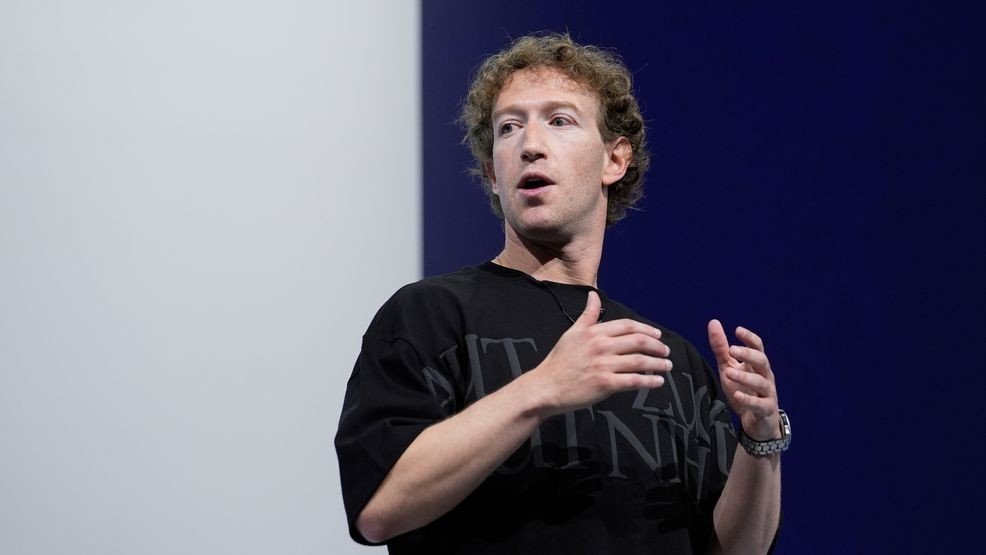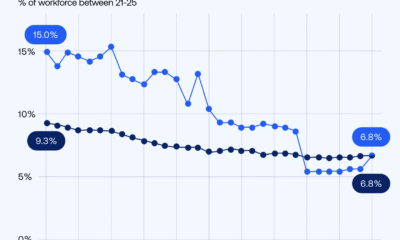AI Insights
Senator claims Meta ignored warnings about teens using AI chatbots

WASHINGTON (TNND) — Lawmakers are continuing to pile pressure on Meta to overhaul its safety procedures and rules for kids using its artificial intelligence products as the industry faces blowback from Congress over the impact it’s having on the nation’s youth.
Sen. Ed Markey, D-Mass., sent Meta CEO Mark Zuckerberg a letter on Monday accusing the company of ignoring warnings about its chatbots and calling on the company to cut off minors from having access to them.
“I write today urging Meta to no longer allow minors to access AI chatbots on its platforms due to alarming recent reporting regarding Meta’s AI chatbot standards and the limited evidence about AI chatbots’ effect on younger users,” he wrote.
Markey said Meta ignored warnings from two years ago that allowing teens to use chatbots would “supercharge” existing problems with social media and posed too many risks.
“Without proper safeguards, AI chatbots pose serious threats to user privacy and safety online, especially for minors. Meta is clearly not taking these risks seriously,” he wrote.
The company has been caught in a new political firestorm for weeks after a Reuters story about an internal policy document that included examples of acceptable conversations between its chatbot and children “that are romantic or sensual” and allowed them to describe children “in terms that evidence their attractiveness.”
Asked for comment on Markey’s letter, Meta pointed to changes it announced last month on its AI interaction with minors. Among them is training AI not to respond to teens on self-harm, suicide, disordered eating and potentially inappropriate romantic conversations.
“We built protections for teens into our AI products from the start, including designing them to respond safely to prompts about self-harm, suicide, and disordered eating. As our community grows and technology evolves, we’re continually learning about how young people may interact with these tools and strengthening our protections accordingly,” the company said in a statement at the time.
Meta said it will “continue to adapt our approach to help ensure teens have safe, age-appropriate experiences with AI.”
The company has said those documents were included in error, though lawmakers have argued the mistake should have never happened in the first place.
“Shockingly, Meta’s legal, public policy and engineering staff, including its chief ethicist, reportedly reviewed and approved this document,” Markey said in his letter. “Although Meta has since stated that its inclusion in the standards document was an error, it is inexplicable — and unacceptable — that it ever happened.”
Meta has a history of intense scrutiny over the effects its social media platforms, Facebook and particularly Instagram, have on children and whether it does enough to minimize the negative consequences. Whistleblowers have claimed the company has long been aware of the harmful outcomes its platforms have on teens but ignored warnings or failed to implement effective changes to protect them.
Its expansion into AI has come with new scrutiny about similar issues, though it is far from the only tech company dealing with pressure from Congress and parents to do more to protect children. Other AI developers have rolled out safety provisions amid mounting pressure from state and federal lawmakers and a growing outcry from parents.
The rapid development of AI has added a new element to the debate over regulating Big Tech. Lawmakers have seized on reports that chatbots have had inappropriate conversations with children or developed problematic relationships with them as evidence companies can’t be trusted to safeguard the country’s youth.
OpenAI announced last week it would take steps over the coming months to address the safety concerns for its underage users, like allowing parents to link accounts with their teens, disable certain features and get notifications when ChatGPT detects distress in an interaction with their children. Those changes come as it faces a lawsuit after a teen died by suicide following an interaction with its chatbot.
Along with pressure from Markey, Meta is also facing an investigation pledged by Missouri Republican Sen. Josh Hawley, who has sent Zuckerberg a request for documents relating to its chatbots. Hawley has also promised to hold hearings investigating the company’s AI guidelines and a new Washington Post report that it suppressed research on child safety.
In a speech earlier this week at the National Conservatism Conference, Hawley said Congress should pass “sensible guardrails” for AI companies to protect children using their products.
“Ultimately, when it comes to guardrails, protecting our children should be our lodestar,” Hawley said. “We absolutely must require and enforce rigorous technical standards to bar inappropriate or harmful interactions with minors. And we should think seriously about age verification for chatbots and agents. We don’t let kids drive or drink or do a thousand other harmful things. The same standards should apply to AI.”
Regulating Big Tech has been a frequent legislative push in Congress for years but lawmakers have struggled to come to a consensus on what the right approach is and shifting priorities about what issues need to be addressed first. Lawmakers have focused recent attention on putting more requirements in place for tech companies to protect kids and their data, though it’s unclear whether a bill will pass into law.
AI Insights
Sevierville uses new artificial intelligence system to fix potholes and rate roadways – WBIR
AI Insights
Copyright, Fair Use, and AI: The Current State of the Law – Events – Morgan Lewis
AI Insights
Alpha School showcases expedited student learning through artificial intelligence alongside state, federal leaders
On Sept. 9, U.S. Secretary of Education Linda McMahon visited Alpha School in Austin alongside Texas Education Agency Commissioner Mike Morath. Alpha School co-founder MacKenzie Price highlighted how the school is using AI to personalize and improve students’ education.
“It’s the most exciting thing I’ve seen in education in a long time,” McMahon said about Alpha School. “I’m incredibly enthusiastic about this.”
How it works
Price started Alpha School in 2014 to provide students with individually tailored, accelerated instruction and opportunities to build life skills beyond the classroom, Price told Community Impact last year. Students complete their academic learning in two hours each day using an AI platform known as 2 Hour Learning.
The platform allows students to learn at their own pace and advance multiple grade levels in different subjects based on their performance. Price said the Alpha School model enables students to learn twice as fast as they would in a traditional school setting.
After completing their academic coursework, students may participate in workshops focused on developing life skills, such as entrepreneurship, leadership, public speaking and financial literacy. Last school year, Alpha School opened three specialized academies, including a GT School for gifted and talented students in Georgetown, esports school NextGen Academy in Northwest Austin, and Texas Sports Academy in the Lake Travis area.
The academies are led by guides, instead of teachers, who focus on motivating students and providing them with emotional support.
“It’s time for us to all hold ourselves responsible for delivering better to these kids,” Price said. “Using artificial intelligence is what enables us to raise human intelligence, not just for the students, but also for the teachers and the guides and for the families.”
The update
Alpha School opened several new academies across the United States this school year, including a K-3 school in Plano and K-8 school in Fort Worth. The company is planning to open an academy in Houston this winter, according to Alpha School’s website.
Alpha School opend a virtual charter school in Arizona and is looking to open a charter school in Bastrop in 2026, Price told Community Impact in February.
Additionally, Alpha School has begun partnering with school districts to implement its 2 Hour Learning platform at some public schools. The 2 Hour Learning program has provided intervention and enrichment for 1,500 public school students across more than 50 districts, said Gaston Griffin, a representative of Studient and former Alpha School guide.
“We want districts [and] schools to pilot this so they could see and experience this incredible opportunity and solution for themselves,” Griffin said.
What they’re saying
Alpha School student Everest Nevraumont said she advanced from a fourth grade to a ninth grade reading level in one school year through the 2 Hour Learning platform.
“In reading, I’m grade nine, but in math, I’m only grade five, because in reading, I’ve advanced way faster,” Nevraumont said.

Alpha School guide Christie Ray, a former public school principal, said she saw students improve from a prekindergarten to a first grade academic level within five months of implementing 2 Hour Learning at a struggling charter school.
“This opens up the opportunity to bring back what is missing in education, which is the love of school and the love of learning,” Ray said. “This is what we did with our students that were in the failing charter school and made them the stewards of their own learning.”
Noah Lightfoot left his teaching position at Dripping Springs ISD to become a guide at Alpha School. Lightfoot said he has been able to form deeper relationships with his students and motivate them to learn through their personal interests.
Zooming out
McMahon, who became secretary of education in March, said she was excited to observe Alpha School’s AI model and see how it could change how other schools in the nation operate. Teachers are most successful when they have the ability to be innovative in their classrooms, she said.
“Let’s be motivated in our states and with our school systems to inspire them to be curious enough to come and understand what is happening here,” McMahon said, “If I could achieve that goal, we would come a long way in improving our education.”
In the 2025 legislative session, state lawmakers allocated $1 billion to provide families with $10,000 education saving accounts, or ESAs, to pay for private school tuition and other educational expenses.
The tuition for Alpha School campuses ranges from $10,000 to $40,000 a year, Price said. Community Impact asked Price if she was hopeful the new ESA program, which becomes effective next school year, would expand access to Alpha School academies for more Texas families.
“Absolutely,” Price said. “[With] more of these types of opportunities for families to jump into private education [and] by getting that support from ESAs, it’s going to open up more opportunities.”
Alpha School academies regularly assess students to determine what they need to learn and build personalized lesson plans, Price said. The company uses AI to monitor how well a student is learning, she said.
On Aug. 27, Texas senators passed House Bill 8 to eliminate the State of Texas Assessments of Academic Readiness and replace it with three shorter tests, which students would take at the beginning, middle and end of each school year.
“Several of the concepts that you heard today are actually part of the new system that we will be deploying in the 2027-28 school year here in Texas,” Morath said about standardized testing at the Alpha School event Sept. 9.
-

 Business2 weeks ago
Business2 weeks agoThe Guardian view on Trump and the Fed: independence is no substitute for accountability | Editorial
-
Tools & Platforms4 weeks ago
Building Trust in Military AI Starts with Opening the Black Box – War on the Rocks
-

 Ethics & Policy1 month ago
Ethics & Policy1 month agoSDAIA Supports Saudi Arabia’s Leadership in Shaping Global AI Ethics, Policy, and Research – وكالة الأنباء السعودية
-

 Events & Conferences4 months ago
Events & Conferences4 months agoJourney to 1000 models: Scaling Instagram’s recommendation system
-

 Jobs & Careers2 months ago
Jobs & Careers2 months agoMumbai-based Perplexity Alternative Has 60k+ Users Without Funding
-

 Education2 months ago
Education2 months agoVEX Robotics launches AI-powered classroom robotics system
-

 Education2 months ago
Education2 months agoMacron says UK and France have duty to tackle illegal migration ‘with humanity, solidarity and firmness’ – UK politics live | Politics
-

 Podcasts & Talks2 months ago
Podcasts & Talks2 months agoHappy 4th of July! 🎆 Made with Veo 3 in Gemini
-

 Funding & Business2 months ago
Funding & Business2 months agoKayak and Expedia race to build AI travel agents that turn social posts into itineraries
-

 Podcasts & Talks2 months ago
Podcasts & Talks2 months agoOpenAI 🤝 @teamganassi























